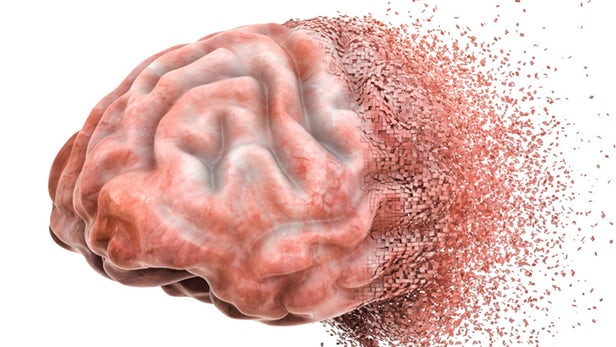

People should exercise more, eat a healthy diet and cut down on alcohol to reduce their risk of dementia, the World Health Organisation (WHO) said.
In its advice for people trying to avoid the brain disorder, the United Nation (UN) health bosses said diabetes, high blood pressure and obesity should also be controlled.
A huge review of existing evidence found age was the strongest risk factor for the memory-robbing condition – but said it is not an inevitable consequence of ageing.
There are already more than 50 million people around the world with dementia and this figure is expected to triple to 152 million by the year 2050.
Although it cannot be cured or prevented with any certainty, people who take good care of themselves may have lower odds of getting it – it is not inevitable, the report said.
Scientists have reacted by calling for more work on medicines to treat dementia and said the report clarifies what they already knew.
The international health experts published the WHO Guidelines on Risk Reduction of Cognitive Decline and Dementia.
“While age is the strongest known risk factor for cognitive decline, dementia is not a natural or inevitable consequence of ageing,” the report said in its introduction.
And its authors added: “Several recent studies have shown a relationship between the development of cognitive impairment and dementia with lifestyle-related risk factors, such as physical inactivity, tobacco use, unhealthy diets and harmful use of alcohol.”
According to new guidelines issued by the WHO, people can reduce their risk of dementia by getting regular exercise, not smoking, avoiding harmful use of alcohol, controlling their weight, eating a healthy diet, and maintaining healthy blood pressure, cholesterol and blood sugar levels.
WHO Director-General, Dr. Tedros Adhanom Ghebreyesus, said: “In the next 30 years, the number of people with dementia is expected to triple. We need to do everything we can to reduce our risk of dementia. The scientific evidence gathered for these Guidelines confirm what we have suspected for some time, that what is good for our heart, is also good for our brain.”
The Guidelines provide the knowledge base for health-care providers to advise patients on what they can do to help prevent cognitive decline and dementia. They will also be useful for governments, policy-makers and planning authorities to guide them in developing policy and designing programmes that encourage healthy lifestyles.
The reduction of risk factors for dementia is one of several areas of action included in WHO’s Global action plan for the public health response to dementia. Other areas include: strengthening information systems for dementia; diagnosis, treatment and care; supporting careers of people with dementia; and research and innovation.
WHO’s Global Dementia Observatory, launched in December 2017, is a compilation of information about country activities and resources for dementia, such as national plans, dementia-friendly initiatives, awareness campaigns and facilities for care. Data from 21 countries, including Bangladesh, Chile, France, Japan, Jordan and Togo, have already been included, with a total of 80 countries now engaged in providing data.
Creating national policies and plans for dementia are among WHO’s key recommendations for countries in their efforts to manage this growing health challenge.
During 2018, WHO provided support to countries such as Bosnia and Herzegovina, Croatia, Qatar, Slovenia and Sri Lanka to help them develop a comprehensive, multi-sectoral public health response to dementia.
An essential element of every national dementia plan is support for carers of people with dementia, said Dr Dévora Kestel, Director of the Department of Mental Health and Substance Abuse at WHO. “Dementia carers are very often family members who need to make considerable adjustments to their family and professional lives to care for their loved ones. This is why WHO created iSupport. iSupport is an online training programme providing carers of people with dementia with advice on overall management of care, dealing with behaviour changes and how to look after their own health.”
Dementia is an illness characterized by a deterioration in cognitive function beyond what might be expected from normal ageing. It affects memory, thinking, orientation, comprehension, calculation, learning capacity, language and judgement. Dementia results from a variety of diseases and injuries that affect the brain, such as Alzheimer disease or stroke.
Dementia is a rapidly growing public health problem affecting around 50 million people globally. There are nearly 10 million new cases every year. Dementia is a major cause of disability and dependency among older people. Additionally, the disease inflicts a heavy economic burden on societies as a whole, with the costs of caring for people with dementia estimated to rise to US$ 2 trillion annually by 2030.
Meanwhile, although the quality of scientific evidence to back up many of the WHO’s recommendations was low, most were recommended to improve general health.
A Mediterranean diet, which it suggested as the ultimate healthy eating, contains a lot of fruit and vegetables, nuts, lentils, beans and potatoes or rice.
The WHO stopped short of saying dementia risk could be reduced by better social interactions, hearing aids for those going deaf or the treatment of depression.
It added at-risk patients could be given brain training activities but there was no science to support taking vitamin B, E or Omega-3 supplements for brain health.
According to the charity Alzheimer’s Research UK, only one in three people (34 per cent) in the country – where around 850,000 people have dementia – realise they can do anything to reduce their risk of the brain damage.
Dr. Carol Routledge, the charity’s director of research, called the WHO report a “valuable resource” which contains “the best possible information”.
What causes dementia? Dementia is not a specific illness but an umbrella term to describe various conditions, which cause irreversible brain damage and ultimately death.
Symptoms of the condition include memory loss, struggling to understand language, physical frailty and poor coordination, and personality changes.
The most common cause of dementia is Alzheimer’s disease, which accounts for between 60 and 80 per cent of cases.
Alzheimer’s is caused by a build-up of waste proteins in the brain that, as they accumulate, disrupt the connections between nerves and eventually cut off and therefore shut down sections of the brain.
Exactly why these proteins build up in some people isn’t known, but people may have a genetically higher risk of it happening, and it is far more common in old people.
Another common type of dementia is vascular dementia, in which parts of the brain are destroyed when their blood supplies are cut off.
Risk factors for vascular dementia include high blood pressure, obesity, smoking and diabetes.
Routledge said: “Sadly, there will always be individuals who address many or all of these risk factors and still develop dementia.
“Genetic predisposition plays an important role in many people’s risk of diseases like Alzheimer’s, and while we cannot change the genes we inherit, taking the steps outlined in this report can still help to stack the odds in our favour.”
What are the WHO’s recommendations? Adults with normal brain function or mild cognitive impairment (a precursor to dementia) should exercise regularly to reduce their risk of brain decline.
Adults who smoke should stop.
People should eat a Mediterranean-like diet – everyone should have a healthy, balanced diet. Vitamin B, E or Omega-3 supplements should not be recommended to people trying to reduce their risk of dementia.
Interventions to reduce ‘hazardous or harmful’ drinking should be targeted at all adults.
Brain training should be offered to older adults with normal brain function or mild cognitive impairment – activities were not specified.
Obesity interventions should be offered to people who are seriously overweight.
High blood pressure, diabetes and high cholesterol should be managed.
There was insufficient evidence to encourage recommending social activities, the management of depression, or wearing hearing aids – but these should all be offered to people who would benefit from them.
“Other recommendations have a less strong evidence base but may have evidence that they do not increase risk or harm, and can therefore be recommended safely, although their impact on risk is less certain.
“While some people are unlucky and inherit a combination of genes that makes it highly likely they will develop dementia, many people have the opportunity to substantially reduce their risk by living a healthy lifestyle.
“If people around the world follow these recommendations, we should be able to reduce the burden of dementias.”
Is there a cure? Currently there is no cure for dementia. But new drugs can slow down its progression and the earlier it is spotted the more effective treatments are.
Post Views: 72
You may be interested

Done Deal: Falconets Forward Joins American Club Carolina Ascent
Webby - November 16, 2024Former Falconets forward Opeyemi Ajakaye has joined USL Super League club, Carolina Ascent FC on loan.Ajakaye linked up with Carolina…

Orban’s Lyon Face Provisional Relegation To Ligue 2 Amid Financial Woes
Webby - November 15, 2024Olympique Lyon the club of Nigerian striker Gift Orban, have been handed a provisional Ligue 1 relegation by theDNCG who…

Ghana Miss Out On AFCON 2025 Qualification After Draw With Angola
Webby - November 15, 2024Black Stars of Ghana’s hopes of qualifying for next year’s AFCON was ended after they played a 1-1 draw away…



















![American Pastor, David Wilson Seen Eating The Box Of Woman Who Isn’t His Wife [Video]](https://onlinenigeria.com/wp-content/uploads/2019/10/american-pastor-david-wilson-seen-eating-the-box-of-woman-who-isnt-his-wife-video-150x150.jpg)








